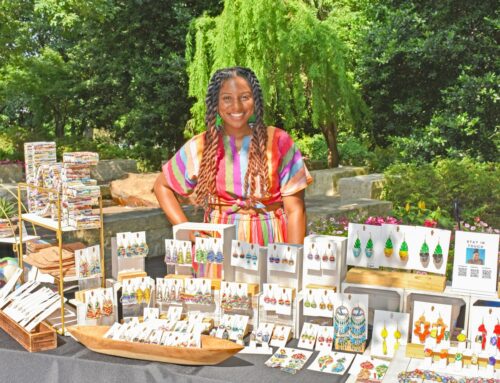The homemade cardboard sign is mounted on a stake and pounded into the ground at the crest of the bridge at the end of Brookside Drive. One side, with a phone number, reads: Houses Cleaned, Grass Cut. The other side: Feng Shui Consultation.
That’s about as simple an introduction as you’re going to get to the Chinese philosophy of feng shui, which has been popping up in our Western culture for the past several years. While most East Dallasites haven’t hired a feng shui consultant, we’ve probably at least heard the term recently or noticed the feng shui magazine at the Whole Foods checkout counter. And now, apparently, we can get “feng shuied” and have our floors waxed and our lawns edged at the same time. What a deal.
And just what does that ominous phrase mean anyway— feng shuied? Who cares about what direction a computer faces — is it conceivable that the way someone’s office is arranged could affect how much money they make? Why should your bedroom be decorated in reds and golds, and how on earth could a picture of your three best friends on the nightstand keep you from getting married? Would you be willing to have your recliner face a different direction if it would improve your golf swing? Can clearing your junk room really give you inner peace, and bring exciting new people or experiences into your life? Feng shui devotees lay claim to quite a bit of evidence to this effect, however anecdotal.
Now, if you just want to sound hip and converse intelligently about feng shui at the neighborhood potluck … you should know that, literally translated, feng shui means “wind and water” and has been used by Eastern practitioners for over 4,000 years to encourage living in harmony with the environment. Correctly applied, it is said to promote health, wealth and happiness by harnessing positive energy (called “chi”) from surrounding objects, architecture and elements of nature.
Just say all that with authority — and hope nobody expects you to explain just what the heck it all means.
Make that a bagel and a painting
Assuming one is unlikely to respond to cardboard road signs, how and why do you end up give feng shui a shot?
Shawn Studer was just having a cup of coffee when he wandered into the gift shop next door saw one of Dahlia Woods’ paintings. Having recently returned to the Dallas area where he grew up, he was in the process of closing on his La Vista Drive home and beginning renovations.
“She (Woods) was there and I started talking to her,” says Studer. “I told her I had bought this house … and I wanted to do a color scheme — I didn’t want all the white, I hate that plain look. I wanted a “feel,” I wanted when people walked in for them to feel a little better when they walked out.”
So the Woods’ paintings became the focal point for his new abode and set the process in motion.
“Clients usually inquire about my artwork, and then inquire about the placement of the artwork,” says Woods, an East Dallas expressionist painter and feng shui advisor. Also a degreed architectural history consultant who has renovated several dozen vintage houses, she has learned to keep an open mind about what it takes to achieve harmony in a personal environment.
Studer was already familiar with feng shui, having studied a number of spiritual practices while working toward his Ph.D. in spiritual education in Arizona. “I had feng shui in my former home,” he says. “and I don’t know a whole lot about it, but I understand about the energy. I think feng shui in our culture is another aspect of … people waking up.
I like the added creative aspect of using the colors in the paintings (as a catalyst for the décor).”
“The relationship of color in their (a client’s) home often comes up when during renovation, and I will go in and consult on the interior,” says Woods. She often finds herself applying the principles of feng shui during her work even if the client hasn’t expressed a specific interest in that service. “Artwork correlates to the feng shui principle — a positive environmental effect.”
Here’s another key to de-mystifying feng shui for the rank and file — the understandable and familiar effect color and the environment have on all of us. After all, you wouldn’t want a house without windows, or a yard without grass and trees, would you? Isn’t it calming, cheering to sit in a sunny yellow kitchen and look out at the blue sky? In its simplest interpretation, feng shui could be considered a form of that.
“Color has its own vibrations,” says Studer. “My home is my sanctuary and I want to create a spiritual feeling and a place of healing.”
Woods used shades of yellow throughout the house, with a soothing moss green for the connecting hallway. As in her own home, she and Studer are mounting a mirror in the kitchen that reflects the burners of the stove, to magnify the warmth and vitality in the “heart” of the home.
Recognizing that all of us have to keep body and soul together, Woods moved Stuffer’s painting, “Angel of Abundance,” to the “wealth” corner of the living room. She also recommended the Studer add some plants (with round leaves), which he is still planning to do. Even plantless, the home has a certain ebullience and a welcoming air.
“You know how when you walk into some homes and it’s very nice, very elegant … but not very comfortable?” queries Studer. “I wanted to create an environment where people feel at home, peaceful.”
Anybody for Chinese?
So how did we end up a neighborhood where anyone would even think about putting up a cardboard sign with the words “feng shui” on it?
“I’ve found a number of people in this area who are interested,” says Karen Ann Tompkins, a feng shui consultant with a number of East Dallas clients. In addition to individual and business consultations, Tompkins teaches classes and works with neighborhood gift shops to stock items used in the practice of feng shui.
“I worked in Taiwan and China for years,” says Robin Brown, owner of The Nest on Henderson. “My degree was in international business. We were opening the shop and met Karen Ann and … .” Brown gestures to the stores’ displays of mirrors, candles and hanging art glass.
If gift and book sales are any indication, the practice of feng shui is more prevalent than perhaps perceived. Borders Books on Lovers Lane even has a feng shui section, separate from the rest of their decorating how-to’s. Pick up a couple of tomes, however, and don’t be surprised if you’re not immediately enlightened. The concepts can be pretty involved.
Tompkins says: “The most basic function of feng shui is that the formations (outside your house) are really more important than the house itself. But we mirror that concept in the placement of objects in the open spaces within the house also.
“You need open space in front of you for chi and opportunity and good things to come to you, and you need support behind you to hold it.”
Tompkins opines that this is “probably why half of North Dallas is living on credit cards” — because the large pools in backyards right next to the house and not separated by foliage (a feng shui rule) are sucking the chi right out.
Looking for love
Money isn’t the number one reason people hire Tompkins, however.
“When I work with corporations, I warn them,” she says. “I’ll talk to their staff about their offices, but when it’s time for questions and the hands go up, the questions will be about their homes, usually their bedrooms.”
Karen Anderson said that her bedroom was teal at the time Tompkins evaluated her home. Teal is all wrong. Too “cool.” And who wants a cool romance?
“I went out a spent a lot of money on new bedding,” laughs Anderson, whose boudoir now sports shades of red and gold — the romance colors. “I am also supposed to cull out some of the books on the bedroom book shelves to leave some open spaces … to leave room for something new to come into my life.”
Teal and blues, however, were just fine for Anderson’s work area. This is because these are a soothing, healing colors — and Anderson is a massage therapist who says she specializes in “neuro muscular, Swedish, Reiki, cranio sacral balancing and escalen massage.” (And you thought feng shui was complicated.)
Anderson also had to do something about that messy pile of mail in the romance corner of her kitchen. “I straightened that out,” she says. “And I keep these two red cups on this tray in front of the coffee maker always, ready for someone to join me.”
“It surprising how many people who want a relationship have their bedrooms filled with pictures of groups and friends, or single objects,” says Tomkins, who also had Anderson place a pair of candles in the romance corner of her living room. “Their homes and their hopes are saying two different things.”
Speaking of the mail pile, Woods also like to stress the feng shui principle of clearing out junk and clutter to “make room” for new experiences and relationships in life, as well as to create serenity.
“A few years ago, I did a house renovation in Nashville,” says Woods. “A doctor and his wife — she was at home with two children — and she just couldn’t get the house organized, a lot on her plate. We did a kitchen renovation and I went back to take photos after the job was done … and the kitchen was in great disarray.
So I found some flowers in the living room, arranged everything to look appropriate for the photo. And then she asked me to come back in a couple of days for me to help her set up and keep organized — to manage the space.
Order and cleanliness are such an intrinsic principle of feng shui. Feng shui deals with a … a calm that you try to give your life. ”
The form of feng shui practiced by Tompkins is considered the “classical” approach and includes time as well as space considerations. Without deluging the reader with explanations of bagua maps and lopans (a sort of really pretty compass that costs a bundle on the feng shui website), let’s just say that some calculations and recommendations are based on the individual’s birth date.
Anderson’s birth date makes her a “west” person. And so she positions the areas where she eats, sits, sleeps and works in westerly directions. She’s even supposed to go in and out different doors than she used to — so that she’s walking in the best directions. As luck would have it, her desk already faced a favorable direction, with the computer backing up to a window with a nice view.
“One of the biggest mistakes people make in their office area is facing a wall, having their computer screen back up to a wall,” says Tompkins. “Computer desks, units, are the worst. Just get a regular desk, bundle the cords and put a plant behind it.”
To further her romantic quest, Anderson, who is also a painter, plans to create some artwork with romance through feng shui as its basis. “It’s surprisingly hard to find pictures of couples,” she says. “So I’m going to paint some with men and women, and with a paired dragon and phoenix.” Apparently, in feng shui, the dragon is a masculine symbol and the phoenix female.
Any sign that it’s working so far? Yes, love is in the air. Anderson says she’s “met someone” and that it’s “serious.”
“He really loves my house,” she says, a twinkle in her eye.
Want to Get Feng Shuied?
There are a number of magazines and books that discuss the practice of feng shui, and you certainly can educate yourself on the subject given enough time and a high level of interest. But it’s not a simple concept to take in or to apply, and if you can afford the $75-100 an hour that most feng consultants charge, that might be the route for you.
When looking for a consultant, there are some helpful questions to ask:
• How long have you been practicing?
• Which school do you practice? (There are different schools of feng shui.)
• Do you have other clients I can talk to, i.e., references?
A first-rate feng shui consultant will tell you exactly what they are going to do and estimate how long it will take. On average, a single person or couple in a moderate-sized home can plan on paying for a half-hour evaluation of their floor plan in advance and about three hours once the consultant is on site. A small apartment could take only two hours; families with large homes, children, live-in relatives, etc. can plan on a considerably longer evaluation.
Be aware that the consultant may recommend measures that involve clearing clutter and even moving furniture from room to room. You’ll get the best return on your investment if you’re someone who is open to change and new experiences.
What you do, who you use for help, and how much time and money you’re willing to invest depends on how seriously you take the subject. You don’t necessarily need to be wary of the novice practitioner or a friend who’s dabbling in feng shui — just make sure the price is right and that you have fun doing it.





